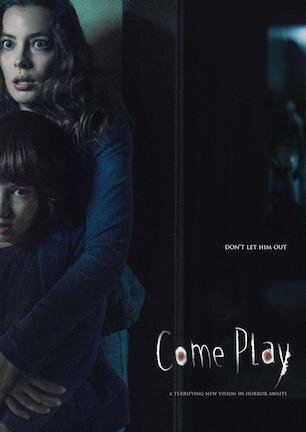Studio: Focus Features
Director: Jacob Chase
Writer: Jacob Chase
Producer: Andrew Rona, Alex Heineman
Stars: Gillian Jacobs, John Gallagher Jr., Azhy Robertson, Winslow Fegley
Review Score:
Summary:
A supernatural creature capable of manifesting through cellphone screens terrorizes an autistic boy and his troubled parents.
Review:
“Come Play” reminds me of “Lights Out” (review here). Both began as popular shorts that producers stretched into feature films. Both involve evil entities manifesting in darkness to terrorize a troubled child. Both feature protective female family members played by midlevel stars who could easily exchange roles without anyone noticing a material difference.
Come to think of it, a number of horror trends and tropes from the 2010s culminate in “Come Play,” which is borderline poetic for one of the final fright films to close out 2020. Like “The Babadook” (review here), “Come Play’s” creature comes out of a cursed children’s rhyme with unknown origins. Like “The Darkness” (review here), an autistic boy’s behavioral issues compound stress that already exists between put-upon parents. Like too many movies to mention, electronic devices figure prominently in how this modern horror propagates. Also like too many movies to mention, a conveniently timed car crash puts a character out of commission when the story needs to temporarily take him off the table. “Come Play” just generally follows a rubber-stamped recipe for standard spooks, not unlike an average Blumhouse title meant for milquetoast appeal to mainstream masses.
Winslow Fegley does a good if overly pouty job scowling as bully Byron, but “Come Play” is newcomer Azhy Robertson’s time to shine as sweetly sympathetic Oliver. Since Oliver is mute, Robertson has to coax out audience sympathy using expressive mannerisms. It’s impressive for an actor of his young age to have this much body language in his vocabulary, yet Robertson possesses the wide eyes, stiffened spines, and nervous shudders necessary to pack plenty of panic into the poor boy.
Being unable to speak also requires Oliver to use an app on his phone to communicate. The phone becomes a portal to supernatural activity when an unusual online storybook introduces Larry. An outcast even among other monsters, Larry desperately wants to find a friend, just like Oliver.
Unlike Oliver, Larry’s wish has wicked intent. If he can acquire the power to appear in the real world, Larry plans to pull Oliver back to his realm. Standing in Larry’s way are Oliver’s protective parents Sarah and Marty, who must reconcile their own estrangement in order to save their son from otherworldly darkness.
Played by Gillian Jacobs, Sarah acts like any movie mom would in such a situation. Terrified by the threat Larry paranormally poses toward her beloved son, Sarah literally says, “I am not letting him out of my sight.” She forgets this declaration however, or rather the script does, whenever “Come Play” needs to separate Oliver for one scare or another. At truly inopportune moments, Sarah turns her attention away long enough for Oliver to have another harrowing encounter with Larry. It’s more than enough to make one wonder, what else can this weary woman possibly have going on elsewhere in their tiny home that’s more important than the matter of her son’s possible murder?
Meanwhile, Marty does the usual disbelieving dad shtick for a bit. Of course he finds out the truth behind his wife’s wild ravings too late and ends up immobilized by the aforementioned Larry-induced accident. After all, you can’t have an arc about a mother repairing the broken bond with her son while dad is in the way. At least being played by John Gallagher Jr. gives the guy enough juice to be more appealing than a hollow conduit for clichéd actions could otherwise be.
Movies like “Come Play” get made because they’re low risks for studios playing it safe. Suits give a cursory once-over to a summary sheet and see rote jolts such as frightening reflections, flickering electricity, exploding light bulbs, and flying furniture. Satisfied that elementary bases are covered, those suits then nod, content in knowing they signed off on another suspense yarn that’ll recoup costs while satisfying a slot on the release calendar. Anything above that would be unexpected gravy, although “Come Play” settles for a straightforward side dish of unseasoned mashed potatoes.
Director Jacob Chase demonstrates decent techniques as far as generic genre games go. Undone a touch by a sentimental epilogue, his movie does include an unexpected ending whose shock injects gusto atypical of a DTV B-movie pretending to be a theatrical thriller. “Come Play” never becomes any more inventively imaginative than that, nor does it set out to even try. Routine is as routine does as far as this fair-to-middling film is concerned.
Review Score: 55






Too slow to ever reach a burn, “The Dreadful” doesn’t have many logs capable of catching fire in the first place, let alone a spark to ignite them.